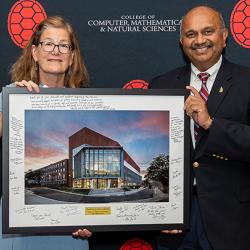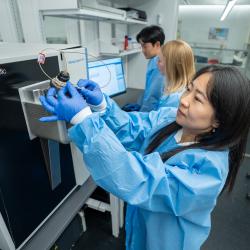Christopher Jarzynski Named Interim Director of UMD’s Institute for Physical Science and Technology
University of Maryland Distinguished University Professor Christopher Jarzynski has been named interim director of the Institute for Physical Science and Technology (IPST), effective July 1, 2025. Jarzynski—who holds appointments in the Department of Chemistry and Biochemistry, the Department of Physics and IPST—previously served as IPST director from 2014 to 2019.

“We are fortunate to have such an experienced academic leader ready to help guide IPST for the next year,” said Amitabh Varshney, dean of UMD’s College of Computer, Mathematical, and Natural Sciences. “Chris brings a strong passion for research and education excellence and community-building.”
IPST’s mission is to pursue interdisciplinary research and education at the boundaries between physics, chemistry, the mathematical and life sciences, and engineering. The institute includes 20 tenured/tenure-track faculty members and nearly 60 graduate students in its biophysics and chemical physics graduate programs. IPST also supports UMD’s node of the Physics of Living Systems student research network, the Burgers Program for Fluid Dynamics, the NCI-UMD Partnership for Integrative Cancer Research, and the Science Academy’s quantum computing master’s and graduate certificate programs.
“I’m excited to take on this role,” Jarzynski said. “I look forward to working with all members of IPST to support and strengthen interdisciplinary science at the University of Maryland.”
A member of the National Academy of Sciences, Jarzynski is a statistical physicist and theoretical chemist who models the random motions of atoms and molecules using mathematics and statistics. Working at the boundary between chemistry and physics, Jarzynski studies how the laws of thermodynamics apply to complex microscopic systems such as living cells and artificial nanoscale machines.
Jarzynski is well known for developing an equation to express the second law of thermodynamics for systems at the molecular scale. The equation is known as the Jarzynski equality. Published in the journal Physical Review Letters in 1997, the paper that introduced his equation has been cited in scientific literature more than 6,000 times.
A 2015 paper that laid the foundation for all diffusion probabilistic modeling for artificial intelligence built on the Jarzynski equality to ensure reversibility of the diffusion model.
In addition, when the 2018 Nobel Prize in physics was awarded for inventions in laser physics, the Nobel Committee cited testing the Jarzynski equality as an application of one of the winning inventions—optical tweezers. Optical tweezers use laser beams to manipulate extremely small objects such as biological molecules.
Jarzynski’s research led to a new method for measuring “free energy”—the energy available to any system to perform useful work—in extremely small systems. This research is fundamental to new technologies and may lay the foundation for the development of molecular and quantum-scale machines.
A Fellow of the American Physical Society (APS) and a member of the American Academy of Arts and Sciences and the National Academy of Sciences, Jarzynski received a 2020 Guggenheim Fellowship, 2020 Simons Fellowship and the 2019 APS Lars Onsager Prize, which recognizes outstanding research in theoretical statistical physics. He was also awarded a Fulbright Scholarship and the Raymond and Beverly Sackler Prize in the Physical Sciences. He serves on the editorial board for the Proceedings of the National Academy of Sciences and the Journal of Statistical Mechanics: Theory and Experiment and is an associate editor for the Journal of Statistical Physics.
Jarzynski has published over 100 peer-reviewed journal articles and mentored more than 40 undergraduate and graduate students and postdocs. He also chaired the University Senate (2023-24).
Jarzynski earned his B.A. in physics from Princeton University in 1987 and his Ph.D. in physics from the University of California, Berkeley, in 1994. After a postdoctoral appointment at the Institute for Nuclear Theory in Seattle, he spent 10 years at Los Alamos National Laboratory. He has been on the faculty of UMD since 2006.
He takes over as IPST director from Mathematics Professor Konstantina Trivisa, who has served in the role since 2020. During her tenure, Trivisa recruited five new faculty members to IPST through joint appointments with the Departments of Mathematics, Physics, Chemistry and Biochemistry, and Mechanical Engineering. She led IPST in launching new initiatives in quantum computing, including a bootcamp for industry professionals, a graduate certificate program and a Master of Science program with the Science Academy.
Trivisa, along with IPST Senior Faculty Specialist Daniel Serrano and other colleagues, was awarded a $2.5 million National Science Foundation Research Training Grant on “The Mathematics of Quantum Information Science.” This grant funds fellowships, research projects and outreach activities that support using advanced mathematical tools to solve quantum information science research problems. Trivisa also supported the establishment of the interdisciplinary Maryland Quantum-Thermodynamics Hub, which is led by IPST Adjunct Assistant Professor Nicole Yunger Halpern and Jarzynski.







